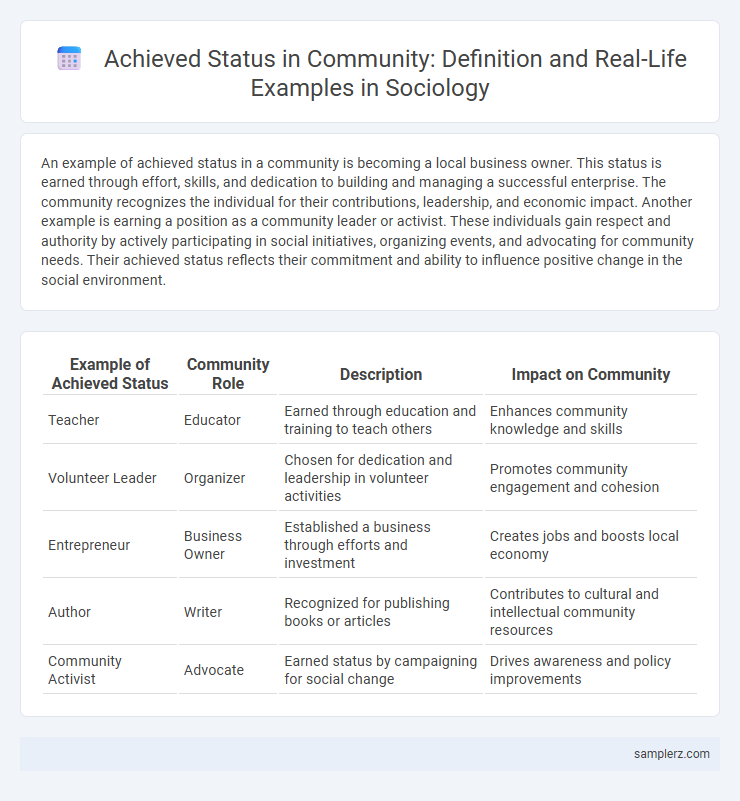An example of achieved status in a community is becoming a local business owner. This status is earned through effort, skills, and dedication to building and managing a successful enterprise. The community recognizes the individual for their contributions, leadership, and economic impact. Another example is earning a position as a community leader or activist. These individuals gain respect and authority by actively participating in social initiatives, organizing events, and advocating for community needs. Their achieved status reflects their commitment and ability to influence positive change in the social environment.
Table of Comparison
| Example of Achieved Status | Community Role | Description | Impact on Community |
|---|---|---|---|
| Teacher | Educator | Earned through education and training to teach others | Enhances community knowledge and skills |
| Volunteer Leader | Organizer | Chosen for dedication and leadership in volunteer activities | Promotes community engagement and cohesion |
| Entrepreneur | Business Owner | Established a business through efforts and investment | Creates jobs and boosts local economy |
| Author | Writer | Recognized for publishing books or articles | Contributes to cultural and intellectual community resources |
| Community Activist | Advocate | Earned status by campaigning for social change | Drives awareness and policy improvements |
Defining Achieved Status in a Social Context
Achieved status in a social context refers to positions or roles acquired through individual effort, skills, or accomplishments rather than being assigned at birth. Examples include becoming a community leader, earning a professional title, or gaining recognition as a volunteer coordinator. These statuses reflect personal achievements and contributions that influence one's social identity and standing within the community.
Community Leaders: Rising Through Service
Community leaders exemplify achieved status by earning respect and authority through dedicated service and active participation in local initiatives. Their influence grows as they address community needs, organize events, and advocate for collective interests, demonstrating commitment rather than inherited privilege. Recognition of their leadership emerges from tangible contributions that foster trust and drive social cohesion within the community.
The Role of Education in Achieved Status
Achieved status in a community often stems from educational attainment, reflecting individual effort and skill development rather than inherited position. Higher education levels correlate with increased social mobility, granting access to professional careers and leadership roles within community organizations. Educational achievements serve as key indicators of merit and competence, shaping social recognition and influence.
Entrepreneurs as Examples of Achieved Status
Entrepreneurs exemplify achieved status within communities by building businesses through innovation, risk-taking, and leadership. Their success is measured by economic impact, job creation, and social influence rather than inherited privilege. This earned recognition highlights the value of personal effort and strategic vision in social mobility.
Achieved Status Through Volunteerism
Achieved status in a community often emerges through active volunteerism, where individuals earn respect and recognition by contributing time and skills to local causes. Volunteer coordinators, community organizers, and disaster relief workers exemplify this status by demonstrating commitment and leadership. Their achieved roles reflect personal effort and social engagement rather than inherited social positions.
Artists and Performers Gaining Social Recognition
Artists and performers achieve social recognition through exhibited talent, public acclaim, and contributions to cultural enrichment, which elevate their status within the community. Successful exhibitions, widespread media coverage, and awards such as Grammys or Oscars serve as tangible markers of achieved status for individuals in the creative arts sector. This recognition often translates into enhanced social capital and influence, affirming their elevated position in societal hierarchies.
Achieved Status Among Activists and Advocates
Achieved status among activists and advocates is evident through their influential roles in advancing social justice, environmental sustainability, and human rights. Recognition often stems from measurable impacts such as leading successful campaigns, shaping policy changes, and mobilizing community support. These accomplishments reflect dedication, expertise, and leadership within various social movements and nonprofit organizations.
Athletes as Community Role Models
Athletes often achieve status in their communities through outstanding sports performance, which earns them respect and admiration. Their dedication, discipline, and leadership inspire youth and promote positive social values such as teamwork and perseverance. This achieved status enables athletes to influence community development and encourage healthy lifestyles.
Healthcare Professionals and Social Esteem
Healthcare professionals, such as doctors and nurses, often achieve high social esteem through their expertise, dedication, and contributions to community well-being. Their achieved status reflects years of education, skill development, and ethical practice, earning trust and respect from the public. This status enhances their influence in shaping public health policies and community healthcare initiatives.
Achieved Status in Local Government Figures
Elected officials such as mayors and council members exemplify achieved status in local government through their community engagement and leadership roles. These positions are earned based on merit, public trust, and active participation in political processes. Their influence shapes policy decisions and resource allocation, reflecting their attained social standing within the community.

example of achieved status in community Infographic
 samplerz.com
samplerz.com